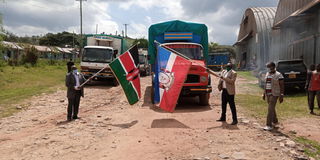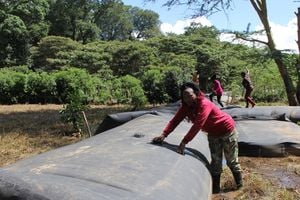Over 39,000 households in Samburu to benefit from relief food

What you need to know:
- Although Samburu has not recorded any coronavirus case, locals are facing difficulties.
- Livestock markets across the county remain suspended due to the pandemic.
- The county purchased 5,000 bags of maize and 500 bags of beans at a cost of Sh27 million to cushion vulnerable residents.
More than 39,000 households in Samburu will benefit from relief food supplies from the county government in efforts to combat the effects of the coronavirus pandemic and desert locusts.
On Sunday, Samburu County Secretary Bosco ole Sambu flagged off seven trucks ferrying the relief rations for distribution across the county as part of the intervention measures.
The food targets locals who are reeling from hard economic times.
Although Samburu has not recorded any coronavirus case, locals are facing difficulties as livestock markets across the county remain suspended due to the pandemic.
HOUSEHOLDS IDENTIFIED
“We have identified vulnerable households in need of support and we will start with those in Samburu North," Mr Ole Sambu said.
He said that Samburu County administration purchased 5,000 bags of maize and 500 bags of beans at a cost of Sh27 million to cushion vulnerable residents.
According to the county secretary, a total of 196,066 locals are targeted in the programme, translating to about 64 per cent of the total population in the county.
"This is the first batch and we have used Sh27 million. We are planning to spend up to Sh109 million to cushion vulnerable families in the next three months," he added.
Mr Ole Sambu also appealed for more support from well-wishers and other donors who have focused their efforts on reaching out to most vulnerable residents.
MORE SUPPORT NEEDED
"We are appealing for more support from well-wishers and donors to the people who have been hard hit by the pandemic and locusts’ effects [to] help them navigate through the hard times," he said.
Samburu County Special Programmes Chief Officer Daniel Lesaigor said his department had assessed and mapped out the most vulnerable members of the community in the three sub-counties.
He said the population that is listed include most vulnerable pastoralists who have been affected by the closure of livestock markets and locusts invasion.
Mr Lesaigor noted that most pastoralists’ life patterns have been greatly disrupted by floods, the locusts’ invasion and now the coronavirus.
He said the system of delivery has been streamlined with strict monitoring from national and county governments.
"We have national and county government representatives to monitor the whole process. After this we will do detailed reports and payments will be based on the reports," he said.





